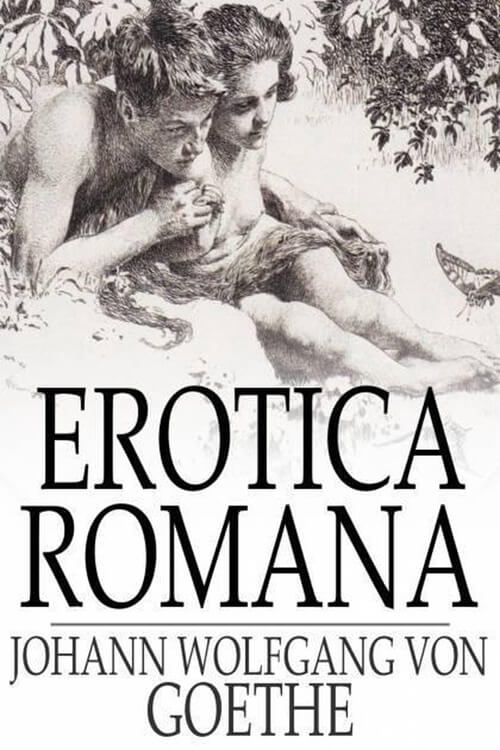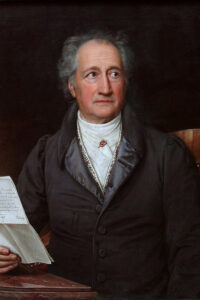
Erotica Romana
Here’s where I’ve planted my garden and here I shall care for love’s blossoms— As I am taught by my muse, carefully sort them in plots: Fertile branches, whose product is the golden fruit of my lifetime, Set here in happier years, tended with pleasure today.
You, stand here at my side, good Priapus—albeit from thieves I’ve Nothing to fear. Freely pluck, whosoever would eat. —Hypocrites, those are the ones! If weakened with shame and bad conscience One of those criminals comes, squinting out over my garden, Bridling at nature’s pure fruit, punish the knave in his hind parts, Using the stake which so red rises there at your loins.
Tell me ye stones and give me O glorious palaces answer. Speak O ye streets but one word. Genius, art thou alive? Yes, here within thy sanctified walls, there’s a soul in each object, ROMA eternal. For me, only, are all things yet mute.
Who will then tell me in whispers and where must I find just the window Where one day she’ll be glimpsed: a creature who’ll scorch me with love? Can’t I divine yet the paths through which over and over To her and from her I’ll go, squandering valuable time?
Visiting churches and palaces, all of the ruins and the pillars, I, a responsible man, profit from making this trip.
With my business accomplished, ah, then shall only one temple, AMOR’s temple alone, take the initiative.
Rome, thou art a whole world, it is true, and yet without love this. The world would not be the world, Rome would cease to be Rome.
More than ever I dreamed, I have found it: my happy good fortune!
Cupid sagaciously led past those palazzos so fine. He of course knows very well (and I have also discovered)
What, beneath tapestries rich, gilded boudoirs conceal.
One may if one wishes call him a blind, wanton boy—but I know you, Clever Cupid, too well! O, incorruptible god!
We were by no means inveigled to enter façades so majestic; Somber cortilé we passed, balcony high and gallant, Hastening onward until a humble but exquisite portal Offered a refuge to both, ardent seeker and guide.
Here he provides me with everything, and sees that I get what I call for; Each day that passes he spreads freshly plucked roses for me. —Isn’t that heaven on earth? Say, beautiful Lady Borghese, What would you give to me more? —You, Nipotina, what yours?
Banquets and game tables, operas, balls, promenades down the Corso? These but deprive my sweet boy of his most opportune times. Finery, and haughtiness do not entice me. Does one not lift a Gown of the finest brocade just as one lifts common wool?
If she’s to press in comfort a lover against that soft bosom, Doesn’t he want her to be free from all brooches and chains?
Must not the jewelry, and then the lace and the bustles and whalebone All of it come off entire, if he’s to learn how she feels?
I encounter no troubles like those. Simple dress of rough homespun, At but a lover’s mere touch, tumbles in folds to the floor. Quickly he carries the girl as she’s clad in chemise of coarse linen— Just as a nursemaid might, playfully up to her bed.
Drapings of satin are absent; the mattress is quite unembroidered. Large is this room where the bed offers its comfort for two.
Read or download Book
Johann Wolfgang von Goethe
Johann Wolfgang (von) Goethe (28 August 1749 – 22 March 1832) was a German polymath and writer, who is widely regarded as the greatest and most influential writer in the German language. His work has had a profound and wide-ranging influence on Western literary, political, and philosophical thought from the late 18th century to the present day.
Biography.
Goethe was a German poet, playwright, novelist, scientist, statesman, theatre director, and critic. His works include plays, poetry, literature, and aesthetic criticism, as well as treatises on botany, anatomy, and color.
Goethe took up residence in Weimar in November 1775 following the success of his first novel, The Sorrows of Young Werther (1774). He was ennobled by the Duke of Saxe-Weimar, Karl August, in 1782. Goethe was an early participant in the Sturm und Drang literary movement. During his first ten years in Weimar, Goethe became a member of the Duke’s privy council (1776–1785), sat on the war and highway commissions, oversaw the reopening of silver mines in nearby Ilmenau, and implemented a series of administrative reforms at the University of Jena. He also contributed to the planning of Weimar’s botanical park and the rebuilding of its Ducal Palace.
Goethe’s first major scientific work, the Metamorphosis of Plants, was published after he returned from a 1788 tour of Italy. In 1791 he was made managing director of the theatre at Weimar, and in 1794 he began a friendship with the dramatist, historian, and philosopher Friedrich Schiller, whose plays he premiered until Schiller died in 1805. During this period Goethe published his second novel, Wilhelm Meister’s Apprenticeship; the verse epic Hermann and Dorothea, and, in 1808, the first part of his most celebrated drama, Faust. His conversations and various shared undertakings throughout the 1790s with Schiller, Johann Gottlieb Fichte, Johann Gottfried Herder, Alexander von Humboldt, Wilhelm von Humboldt, and August and Friedrich Schlegel have come to be collectively termed Weimar Classicism.
The German philosopher Arthur Schopenhauer named Wilhelm Meister’s Apprenticeship one of the four greatest novels ever written, while the American philosopher and essayist Ralph Waldo Emerson selected Goethe as one of six “representative men” in his work of the same name (along with Plato, Emanuel Swedenborg, Montaigne, Napoleon, and Shakespeare). Goethe’s comments and observations form the basis of several biographical works, notably Johann Peter Eckermann’s Conversations with Goethe (1836). His poems were set to music by many composers including Mozart, Beethoven, Schubert, Berlioz, Liszt, Wagner, and Mahler.






